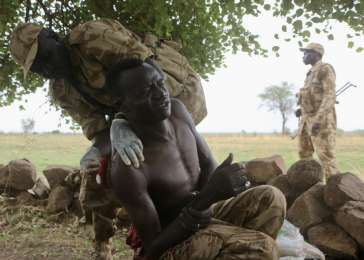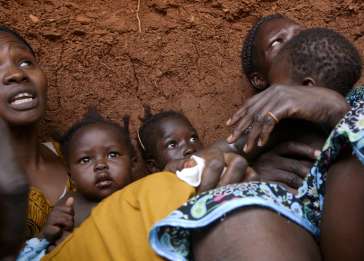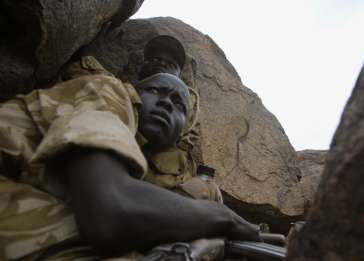July 16, 2013

Over the past two years, a humanitarian crisis has been building in the border areas between Sudan and South Sudan in the context of a civil war between the government of Sudan and rebels from the Sudan People's Liberation Movement—North. During this period, hundreds of thousands of civilians have fled the fighting, the Sudanese air force is indiscriminately bombing civilian targets, and humanitarian groups are reporting on the dangers of widespread famine because the government of Sudan has been blocking aid from reaching civilians in the Nuba Mountains. The Center for the Prevention of Genocide asked Andrew Berends, an experienced documentary filmmaker who is in the Nuba Mountains to document the war there for a new film, to share some of his photos and reflections on what he is seeing in this land that has been virtually cut off from outside assistance or eyewitnesses.
The Battle for Al-Hemer with Kuku Jass
Text and Photos by Andrew Berends
After almost four months in rebel-controlled territory in Sudan’s Nuba Mountains, I finally prevailed on Major General Jagot Makuwar of the Sudan People’s Liberation Army – North (SPLM-N) to allow me to “attend” a battle. He laughed, “We’ve been trying to keep you from getting hurt, but you keep asking. Spend the night, and tomorrow you’ll move.” I strolled out of the general’s headquarters into the rugged village of Jegebah. Rainy season was finally starting, and the first grasses were beginning to transform the dry rocky terrain into a lush green landscape. I went to sleep, like I did most nights, under the stars, wondering what the next day held in store.
As promised, in the morning after tea, Jagot gave me and my translator Ajurad our instructions. We set off on motorcycle to Buram County to find the rebel commander Kuku Jass. With every turn the dirt roads changed from mud to clay to rock to sand. We cruised through the deep tire tracks of trucks that had passed through the mud, and went off-road where the roads were flooded. We navigated narrow trails leaving us bleeding from the thorn bushes. We passed through rebel checkpoints with an official letter from the general. When we arrived in Buram, the few brick buildings were pockmarked with bullet holes. “This is where the war started,” Ajurad said. But I’d been told the same about many places I’d visited. 
Kuku Jass commands a battalion of a few hundred foot-soldiers and assorted artillery including a dozen vehicles mounted with heavy caliber guns, mortars and anti-aircraft weapons. By the following evening, his full force was assembled in the village of Shatt Dammam. It was there that I began to witness the phenomenon of an old-school style of land war unlike anything I’d experienced on the city streets of Iraq or with the guerilla fighters in Nigeria’s Niger Delta. The villagers welcomed the rebels even as most families and children abandoned their huts and moved up into the rocky hills for the duration of the operation.
For the next two days, the soldiers were fed meat, meat and more meat as they powered up for an assault on the government forces that controlled the nearby village of Al-Hemer. We ate five meals the first day – goat meat and cow meat dripping in its own juices, the bones chopped open so you could suck out the nutritious marrow – fuel for the small army on the eve of battle.
Kuku was a gracious host. The veteran rebel commander took the time to explain why he believes the war is a good thing for the Nuba Mountains and Sudan. This current round of fighting in a conflict that has lasted for decades kicked off in 2011 after a disputed election. When it became clear that a peace agreement negotiated in 2006 would no longer hold, Kuku believed that war was the best option. “It will be so awful that when it’s finally over both sides will guarantee the peace.” It has been awful. A few hundred thousand people from the Nuba Mountains, Darfur and Blue Nile State have fled to refugee camps in neighboring South Sudan. Many thousands more are displaced within the Nuba Mountains where it is very difficult for international humanitarian assistance to reach them.
On the second day in Shatt Dammam, Kuku gave a rousing address to his soldiers. He reminded the all-volunteer force why they are fighting. He prevailed on those carrying heavier weapons not to retreat and leave those with only Kalashnikovs or other small arms exposed. Ammunition was distributed. When the sun was low in the sky the soldiers began a march through the night that would take them within striking distance of Al-Hemer. I was prohibited from moving with the foot soldiers and ordered to remain with Kuku. We caught a few hours of sleep, and moved out by vehicle in the early morning arriving in time to observe the start of the assault.
As we took up a position on a rocky hillside on the outskirts of the battleground, the sounds of war took over the landscape: machine gun fire, shelling, and the occasional whiz of a rocket-propelled-grenade. In the distance, I could see flashes from the assorted weaponry and smoke from the impact of rockets and mortar shells. Within half an hour, the first wounded rebel came walking out accompanied by two of his comrades. He was treated under a shade tree while a fellow soldier hand-washed the wounded man’s blood-soaked shirt in a basin of water. A bullet had entered near his neck and exited through his armpit. As the medical officer packed the wound with gauze, two whistling mortar shells came our way causing a moment of panic. The soldier remained stoic and masked most of his pain. The wound didn’t look too bad, but it festered and a day later the arm was amputated.
About two hours into the battle, two helicopter gunships arrived delivering reinforcements to the government forces. The rebels moved an anti-aircraft gun into position at the base of our hill. Then the dreaded Antanov arrived. We could hear the hum of the Russian-made cargo plane circling overhead and we waited for the sound of falling bombs. My camera was trained on one of the rebels looking up at the plane when he quickly ducked into a rocky crevice as the bomber unleashed its payload. Everybody scrambled to hide. I couldn’t find a good spot, so I lay flat in the dirt as I felt the blast of three bombs impacting nearby.
The battle lasted around five hours. The rebels were repulsed and came trickling out on foot or clinging to gun-trucks. Everybody gathered around a deep well and took turns filling their canteens.
Before long, I was back in Kuku’s vehicle headed back to Shatt Dammam. Crammed in the front seat with no translator, Kuku turned to me and said, “Me, I repeat,” indicating that they would soon remount the assault on Al-Hemer.
“Today?” I asked in broken Arabic. He nodded. “And me? I repeat?”
Kuku laughed, “You, you’re finished.”
The rebel command was glad that I’d been able to cover the battle and emerge unscathed. I’d learned how far I could push them (by pushing too hard sometimes), and knew that my access was coming to an end. The next morning, as I prepared to make the journey back to Jegebah, the rebels began to shell Al-Hemer intensively. Every impact echoed through the mountains promising the start of a more intense battle than the day before. I counted over forty explosions as Ajurad and I set off on the motorbike.
As we motored through the rugged countryside, I reflected on the glimpse I’d been given into this forgotten war. I was struck, as I always am, by the absurdity of grown men trying to kill each other with guns and missiles. At the same time, I found an appreciation for the tenacity of the rebels who have volunteered to march without armor into battle, believing they have no choice but to fight for the survival of their families and culture against an enemy who would just as soon see the Nuba people subdued and “arabized” or simply wiped off the map.
But will this war see an end any time soon? I am less confident than Kuku that the warring parties are anywhere near settling into a lasting peace. Kuku Jass, General Jagot Makuwar and all the rebel command are counting on international intervention to resolve the ongoing conflict in Sudan. During our final conversation, I told the general that I don’t believe any substantial intervention is forthcoming. But he believes if the rebels carry their attack far enough, the world will have to take notice. “When we reach, Khartoum, they will have to act. If not, we’ll do it ourselves. We are strong now."
